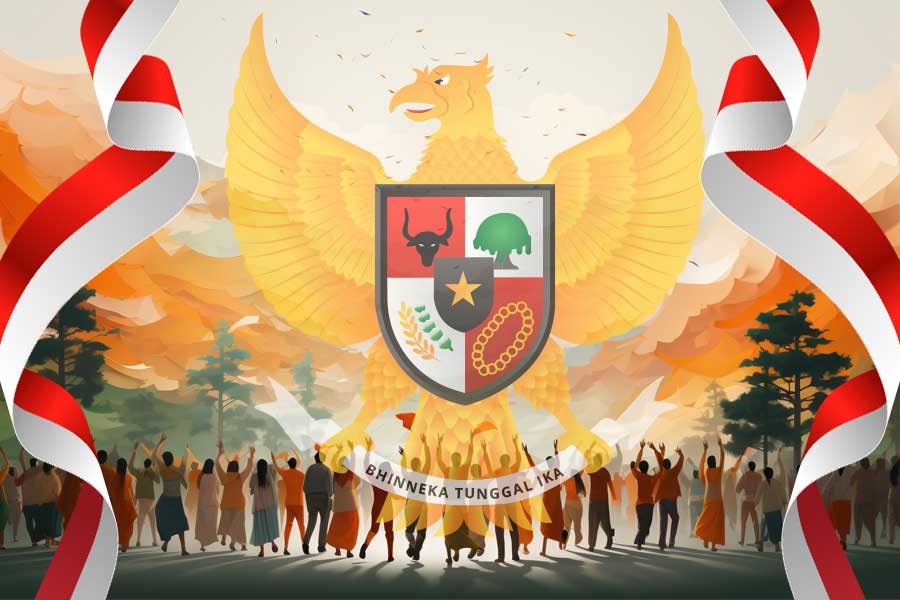Pancasila as the Foundation for Safeguarding Human Rights

By: Prof. Dr. Drs. Ermaya Suradinata, S.H., M.H., M.S.
Editor: Dhania Puspa Purbasari
Pancasila, as the state foundation of Indonesia, has been the main guide in the life of the nation and state since independence. However, the challenges of globalization, modernization, and social change demand the strengthening of this ideology to ensure the sustainability of democracy and the protection of human rights.
Pancasila, which is comprised of five precepts, is the philosophical and ideological foundation of the Indonesians. Each precept has a deep and interrelated meaning in building a just and prosperous society.
The precept of “Belief in the Almighty” recognizes the existence of God and promotes tolerance among religious communities. In the context of globalization, strengthening this value means respecting religious diversity and preventing radicalism.
The precept of “Fair and Civilized Humanity” emphasizes the importance of human dignity and social justice. Its application in the modern era demands fair law enforcement and the protection of basic individual rights.
The precept of “Unity of Indonesia” emphasizes national unity and integrity. Amid the challenges of ethnicity and regionalism, strengthening this value means promoting inclusive nationalism and overcoming social fragmentation.
“Democracy Led by Wisdom in Consultation/Representation” encourages people’s participation in the democratic process through deliberation and representation. Strengthening this value is important to ensure transparent and accountable governance.
The precept of “Social Justice for All Indonesians” guarantees equitable distribution of wealth. In the era of a global economy, strengthening this value means addressing social and economic disparities through inclusive policies.
Thus, democracy in Indonesia cannot be separated from the values of Pancasila. Pancasila democracy emphasizes the principles of deliberation and consensus, in contrast to liberal democracy which emphasizes majority voting. Community participation in Pancasila democracy encourages active involvement of the community in the decision-making process.
This implies the importance of political education and empowerment of communities to become more involved in democracy. Wise Leadership emphasizes that leaders are expected to lead wisely and responsibly. In the modern context, this means transparency, accountability and avoidance of corrupt practices.
Democracy of Pancasila also emphasizes the balance between individual rights and obligations to society, which is particularly relevant in the face of the challenges of individualism and egoism in modern society. Pancasila as a state ideology is thus capable of protecting and promoting human rights.
Each of the precepts of Pancasila – as outlined above – provides a framework for the protection of human rights in Indonesia. As such, Pancasila not only protects civil and political rights, but also rights related to the well-being and quality of life of every individual.
Fair law enforcement is also a key principle in Pancasila, which is affirmed in the second and fifth precepts. Non-discriminatory and fair law enforcement ensures that every citizen receives equal treatment under the law. This is important to maintain public trust in the legal system and government.
Legal reform and enhancing the capacity of law enforcement are essential to ensure the protection of human rights and justice. Fair and non-discriminatory law enforcement is the main foundation in maintaining public trust in the state.
Therefore, legal reform efforts must continue to eliminate corrupt practices and strengthen the rule of law. Thus, the ideology of Pancasila, democracy and human rights can be realized in the life of the nation.
By ensuring that the law is fairly enforced, the state can protect human rights and promote social justice, which is the foundation of the nation. So to strengthen the ideology of Pancasila, democracy and human rights, it is increasingly implemented with a holistic and sustainable strategy.
Meanwhile, on the other hand, education and socialization of Pancasila education is always improved at all levels of education, this is to instil basic values from an early age. Through comprehensive education, the younger generation will better understand human rights and appreciate the importance of Pancasila in daily life, and be able to face the challenges of globalization and modernization based on national values.
The government must also implement inclusive and fair policies to address social and economic disparities. Policies that favor the welfare of the people must be implemented to ensure equitable distribution of wealth and the creation of social justice. In addition, strengthening democratic institutions such as the Election Commission, the Election Supervisory Board, and the Judiciary is also needed to ensure a transparent and accountable democratic process. With strong democratic institutions, elections and oversight processes in place, public confidence in the democratic system can be maintained.
Strengthening the ideology of Pancasila, democracy and human rights is an ongoing effort to ensure the sustainability of a just, prosperous and civilized Indonesia. With the right strategy, Pancasila can be a solid foundation in facing the challenges of the times and maintaining harmony in the nation’s diversity.
Prof. Dr. Drs. Ermaya Suradinata, S.H., M.H., M.S. was Governor of Lemhannas RI (2001-2005) and Director General of Social Politics of the Ministry of Home Affairs (1998-2000). He is currently Chairman of the Board of Trustees of the Center for Geopolitics & Geostrategy Studies Indonesia (CGSI), Chairman of the Expert Council Team of the Indonesian Pancasila Ideology Development Agency (BPIP).
